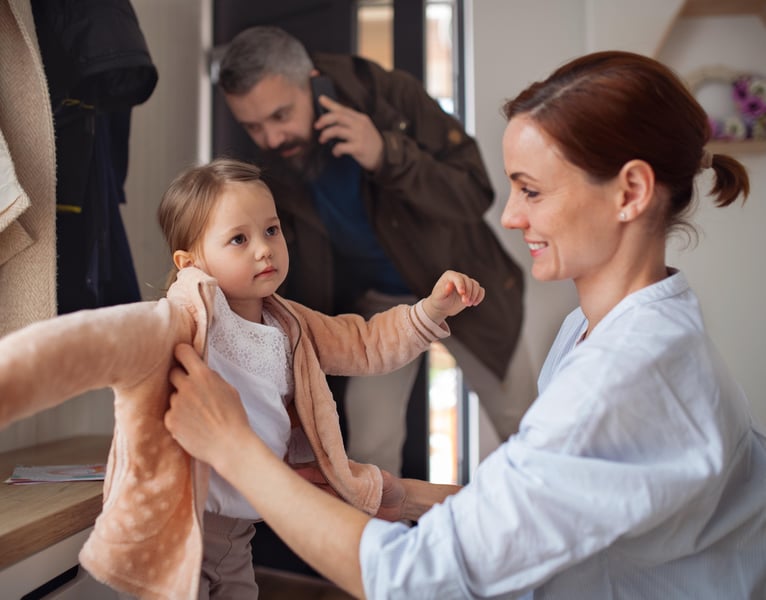Get Healthy!

- Denise Mann
- Posted September 12, 2023
Kids Have Already 'Normalized' Gender Roles by Preschool, Study Finds
So much for the powerful feminist messaging in the new Barbie movie.
Director Greta Gerwig's feminist interpretation of Barbie depicted the fashion dolls as judges, surgeons, naval officers, astronauts and U.S. Presidents in Barbie World, and it resonated. The Barbie movie broke box office records this summer.
But new research shows most people are not living in this re-imagined Barbie world. Parents in China and the United States are still modeling old-fashioned gender roles such as mom doing the cooking and cleaning and dad working outside of the home, and kids are picking up on this and normalizing it at very young ages, new research shows.
"What we do in the home matters,"said study author Allegra Midgette, an assistant professor in the department of psychological and brain sciences at Texas A&M University in College Station.
"Children at very young ages notice what parents are doing, and simultaneously develop ideas of what is fair, OK and, eventually, what is ideal,"she said.
For the study, published online Sept. 11 in the Proceedings of the National Academy of Sciences, researchers surveyed 106 Chinese and 109 American kids aged 3 to 10 and one of their caregivers to get a better handle on who performs more of the common household and child care duties. Kids were asked who prepares meals more frequently, who vacuums or cleans the home more, who fixes things that break, and who takes care of them when they are sick. Kids were also asked if they were OK with these roles. Caregivers were asked similar questions about their roles at home.
Most kids believed that women performed the majority of household tasks by the time they started preschool, the study found. Caregivers agreed that moms do most of the housework. In addition, nearly all children and caregivers in both cultures thought the distribution of labor at home was fine.
These ideas take hold when kids are young, she said. "Six-year-old young girls expect to be more likely to stay at home and do more of the family-related work,"Midgette said. "Parents need to be conscious about how they decide to divide things at home because these divisions have implications for children's futures."
These expectations have spillover effects on who gets paid more, who gets hired and who gets to have their career prioritized in the workforce.
"It may be important to not only encourage girls to be critical of inequitable household practices that will inevitably encourage them to take on more of their family labor, but also to encourage boys who have chances to become involved fathers and caregivers within the family,"Midgette added.
It's time to break this cycle, she said. "Given that children notice this inequality, and also normalize it, it is important to have conversations early on with children that encourage children to be critical of the practices that exist and help them imagine a different and more egalitarian future," Midgette said.
The new study highlights a pervasive and troubling issue in society, experts noted.
"Children learn by observing, and normalization of gender roles occurs at a very young age,"said Ronald Levant, a retired professor of psychology at the University of Akron in Ohio.
It's time to shake things up, he said. "The best way to promote gender equality is to model it," said Levant.
"Dads can take on morning duty and get kids dressed and off to school, and moms can gas up the car, mow the lawn or shovel snow,"he suggested.
Families should include children in household tasks, added Deborah Best, a professor of psychology at Wake Forest University in Winston-Salem, N.C.
"Girls can take out the trash, and boys can wash dishes,"said Best. "Parents should include kids in the discussion of household tasks, and both parents should participate in all tasks, providing role models for the kids."
This will set them up to be more independent adults, Best said.
"Promoting or supporting such gendered behaviors teaches kids that inequality is OK, which it isn't, and it allows kids not to know how to do tasks that are valuable to themselves and the family,"she added.
More information
Save the Children.org has more on how gender roles can create lifelong patterns of inequality.
SOURCES: Allegra Midgette, PhD, assistant professor, department, psychological and brain sciences, Texas A&M University, College Station; Deborah Best, PhD, William L. Poteat professor of psychology, Wake Forest University, Winston-Salem, N.C.; Ronald Levant, retired professor, psychology, University of Akron, Ohio; Proceedings of the National Academy of Sciences, Sept. 11, 2023, online


